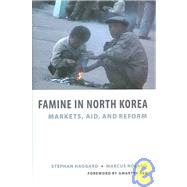Famine in North Korea : Markets, Aid, and Reform
, by Haggard, Stephan- ISBN: 9780231140003 | 0231140002
- Cover: Hardcover
- Copyright: 3/1/2007
In the mid-1990s, as many as one million North Koreans died in one ofthe worst famines of the twentieth century. The socialist food distribution systemcollapsed primarily because of a misguided push for self-reliance, but wascompounded by the regime's failure to formulate a quick response-including theblocking of desperately needed humanitarian relief.Ashouseholds, enterprises, local party organs, and military units tried to cope withthe economic collapse, a grassroots process of marketization took root. However,rather than embracing these changes, the North Korean regime opted for tentativeeconomic reforms with ambiguous benefits and a self-destructive foreign policy. As aresult, a chronic food shortage continues to plague North Korea today.In their carefully researched book, Stephan Haggard and MarcusNoland present the most comprehensive and penetrating account of the famine to date,examining not only the origins and aftermath of the crisis but also the regime'sresponse to outside aid and the effect of its current policies on the country'seconomic future. Their study begins by considering the root causes of the famine,weighing the effects of the decline in the availability of food against its poordistribution. Then it takes a close look at the aid effort, addressing thedifficulty of monitoring assistance within the country, and concludes with ananalysis of current economic reforms and strategies ofengagement.North Korea's famine exemplified the depredationsthat can arise from tyrannical rule and the dilemmas such regimes pose for thehumanitarian community, as well as the obstacles inherent in achieving economic andpolitical reform. To reveal the state's culpability in this tragic event is a vitalproject of historical recovery, one that is especially critical in light of ourcurrent engagement with the "North Korean question."






